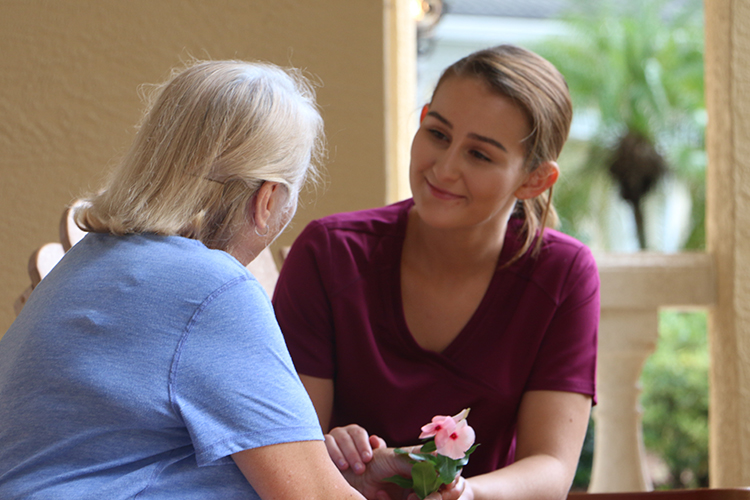Hiring an in-home caregiver will simplify your life and give you peace of mind that your loved ones are safe. However, not all caregivers are going to be a great fit.
When you are in the process of hiring home care help for a senior, you will want to make sure you ask yourself a few questions: Do they have the right experience? Are they hard working? Is their personality a good fit for the senior?
If you do your due diligence during the hiring process of an in-home caregiver, you can avoid issues down the line and be confident you made the right choice.
This post explores the roles and responsibilities of an in-home caregiver, and how should manage the hiring process.
What Can I Expect From an In-home Caregiver?
Hiring a caregiver to provide assistance to a senior in the home will allow them to age in place and avoid the costs of assisted living.
Before you hire a home caregiver you need to first determine what kind of help the senior requires. Chances are you have already done a breakdown of the senior’s daily, monthly and annual tasks to see what they might need assistance with.
You will then hire a caregiver whose qualifications suit the tasks the senior can no longer do themselves.
Examples of Services Provided By In-home Caregivers Include:
- Basic housekeeping
- Meal preparation
- Laundry
- Medication reminders (but not administration)
- Companionship
- Transportation
Caregivers come with different qualifications, and there are differences in the services they can provide. For example, a home care worker is not qualified to lift patients or provide physical care, but a personal support worker is.
Be sure to read our post on the types of home care workers for a clearer distinction.
If you are hiring a caregiver through an in-home care agency, they will help you determine what type of caregiver would be best.
Questions to Ask When Interviewing a Caregiver
Getting confident and thoughtful answers when interviewing a caregiver will demonstrate their experience and ability to care well for the senior. You want to make sure you ask a variety of behavioral and situational questions to make sure they are skilled and not repeating answers they rehearsed.
Basic Questions to Ask
These questions are meant to provide a background on the caregiver and ensure they have the right qualifications to care for your loved one.
- What experience do you have caring for someone with similar needs?
- How long was your last job? Why did you leave?
- Are you willing to follow our major house rules? (no smoking, no guests etc.)
- What qualifications or certifications do you hold? (ask for proof)
- Are you insured?
- Are you willing to submit to a background check?
- Do you have a valid driver’s license and clean driving record?
Behavioral Questions
Asking these questions assesses how the caregiver deals with stress and implements feedback. This will make sure they have the right attitude to do their job, even on hard days.
- Tell me about a time you had a difficult client and how you resolved the problem.
- Why did you decide to become a caregiver?
- What special touches can you bring to make me hire you over someone else?
- How do you react to feedback from your employer?
Situational Questions
These questions test a caregiver on what their response would be in certain situations. You will want to make sure the questions are tailored to conditions that the senior has to make sure they would provide the best help.
Ideally, the caregiver should link their answer to past experiences that you can verify through references.
Here are some examples:
- What would you do if your client didn’t want to take their medication?
- What would you do if your client was acting lethargic and confused?
- What would you do in the event that your client fell?
Importance of Checking References
A candidate may seem perfect, but you should always check references. You will want to ensure that they did not misrepresent themselves in the interview.
You should ask for 2-3 references from a job that was similar to the responsibilities you are hiring them for.
What Makes a Good Reference For a Caregiver?
- The experience should have been fairly recent
- Should be able to talk on the phone so you can ask as many questions as you need
- Not related to the caregiver
What Questions Should I Ask Caregiver References?
- How long did the caregiver work for you, and in what capacity?
- Was the caregiver punctual?
- Did the caregiver have a good attitude while working? Show enthusiasm?
- Did the care recipient enjoy interacting with the caregiver?
- Did the caregiver always keep you informed of what was going on?
- What was your favorite thing about working with the caregiver?
- Were you satisfied with the caregiver’s overall job performance?
Have a Home Care Help Trial Period
Before you fully commit to hiring a caregiver, discuss the idea of a paid trial period. Adding this conditional period into a contract gives you an easy way to part ways with the caregiver should you find they are not a good fit.
Once you commit to the hire, you will have the confidence to know they will take great care in the work and keep your loved one safe.

